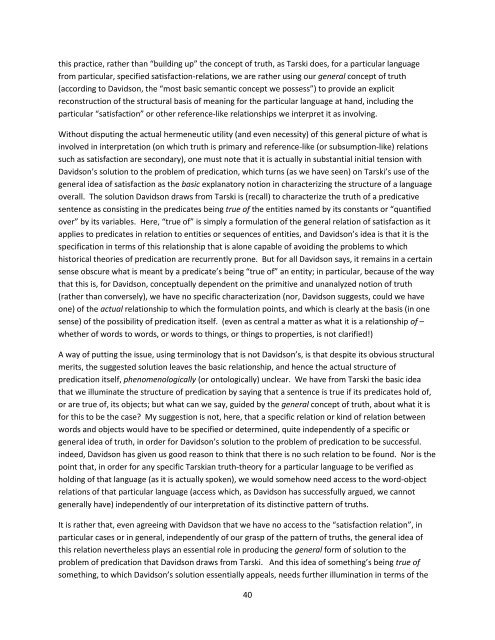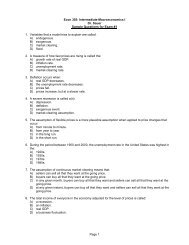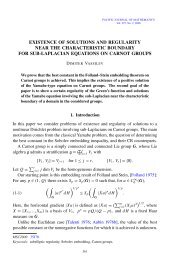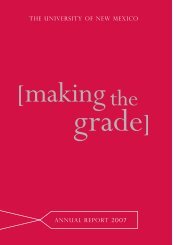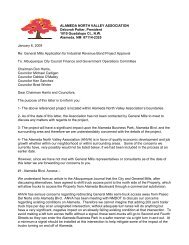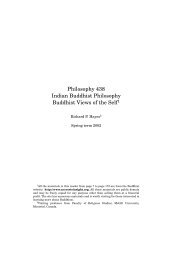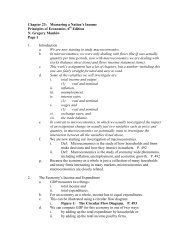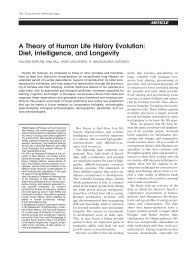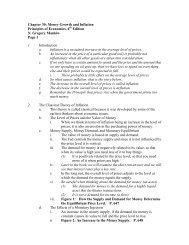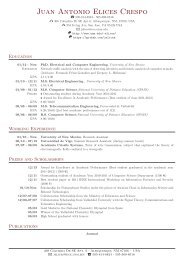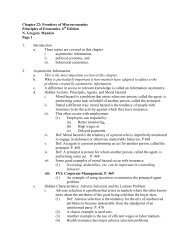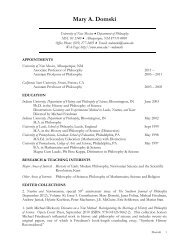Heidegger, Tugendhat, Davidson - University of New Mexico
Heidegger, Tugendhat, Davidson - University of New Mexico
Heidegger, Tugendhat, Davidson - University of New Mexico
Create successful ePaper yourself
Turn your PDF publications into a flip-book with our unique Google optimized e-Paper software.
this practice, rather than “building up” the concept <strong>of</strong> truth, as Tarski does, for a particular language<br />
from particular, specified satisfaction-relations, we are rather using our general concept <strong>of</strong> truth<br />
(according to <strong>Davidson</strong>, the “most basic semantic concept we possess”) to provide an explicit<br />
reconstruction <strong>of</strong> the structural basis <strong>of</strong> meaning for the particular language at hand, including the<br />
particular “satisfaction” or other reference-like relationships we interpret it as involving.<br />
Without disputing the actual hermeneutic utility (and even necessity) <strong>of</strong> this general picture <strong>of</strong> what is<br />
involved in interpretation (on which truth is primary and reference-like (or subsumption-like) relations<br />
such as satisfaction are secondary), one must note that it is actually in substantial initial tension with<br />
<strong>Davidson</strong>’s solution to the problem <strong>of</strong> predication, which turns (as we have seen) on Tarski’s use <strong>of</strong> the<br />
general idea <strong>of</strong> satisfaction as the basic explanatory notion in characterizing the structure <strong>of</strong> a language<br />
overall. The solution <strong>Davidson</strong> draws from Tarski is (recall) to characterize the truth <strong>of</strong> a predicative<br />
sentence as consisting in the predicates being true <strong>of</strong> the entities named by its constants or “quantified<br />
over” by its variables. Here, “true <strong>of</strong>” is simply a formulation <strong>of</strong> the general relation <strong>of</strong> satisfaction as it<br />
applies to predicates in relation to entities or sequences <strong>of</strong> entities, and <strong>Davidson</strong>’s idea is that it is the<br />
specification in terms <strong>of</strong> this relationship that is alone capable <strong>of</strong> avoiding the problems to which<br />
historical theories <strong>of</strong> predication are recurrently prone. But for all <strong>Davidson</strong> says, it remains in a certain<br />
sense obscure what is meant by a predicate’s being “true <strong>of</strong>” an entity; in particular, because <strong>of</strong> the way<br />
that this is, for <strong>Davidson</strong>, conceptually dependent on the primitive and unanalyzed notion <strong>of</strong> truth<br />
(rather than conversely), we have no specific characterization (nor, <strong>Davidson</strong> suggests, could we have<br />
one) <strong>of</strong> the actual relationship to which the formulation points, and which is clearly at the basis (in one<br />
sense) <strong>of</strong> the possibility <strong>of</strong> predication itself. (even as central a matter as what it is a relationship <strong>of</strong> –<br />
whether <strong>of</strong> words to words, or words to things, or things to properties, is not clarified!)<br />
A way <strong>of</strong> putting the issue, using terminology that is not <strong>Davidson</strong>’s, is that despite its obvious structural<br />
merits, the suggested solution leaves the basic relationship, and hence the actual structure <strong>of</strong><br />
predication itself, phenomenologically (or ontologically) unclear. We have from Tarski the basic idea<br />
that we illuminate the structure <strong>of</strong> predication by saying that a sentence is true if its predicates hold <strong>of</strong>,<br />
or are true <strong>of</strong>, its objects; but what can we say, guided by the general concept <strong>of</strong> truth, about what it is<br />
for this to be the case? My suggestion is not, here, that a specific relation or kind <strong>of</strong> relation between<br />
words and objects would have to be specified or determined, quite independently <strong>of</strong> a specific or<br />
general idea <strong>of</strong> truth, in order for <strong>Davidson</strong>’s solution to the problem <strong>of</strong> predication to be successful.<br />
indeed, <strong>Davidson</strong> has given us good reason to think that there is no such relation to be found. Nor is the<br />
point that, in order for any specific Tarskian truth-theory for a particular language to be verified as<br />
holding <strong>of</strong> that language (as it is actually spoken), we would somehow need access to the word-object<br />
relations <strong>of</strong> that particular language (access which, as <strong>Davidson</strong> has successfully argued, we cannot<br />
generally have) independently <strong>of</strong> our interpretation <strong>of</strong> its distinctive pattern <strong>of</strong> truths.<br />
It is rather that, even agreeing with <strong>Davidson</strong> that we have no access to the “satisfaction relation”, in<br />
particular cases or in general, independently <strong>of</strong> our grasp <strong>of</strong> the pattern <strong>of</strong> truths, the general idea <strong>of</strong><br />
this relation nevertheless plays an essential role in producing the general form <strong>of</strong> solution to the<br />
problem <strong>of</strong> predication that <strong>Davidson</strong> draws from Tarski. And this idea <strong>of</strong> something’s being true <strong>of</strong><br />
something, to which <strong>Davidson</strong>’s solution essentially appeals, needs further illumination in terms <strong>of</strong> the<br />
40


